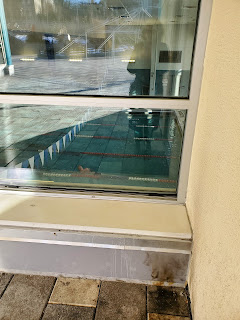I have had a very enjoyable time doing the first two boxes of "Chemical Exile," the psychogeographical theater piece by the Rorschach Theater. Each of the seven boxes directs you to a specific location and provide you photos, letters, objects, etc. as a chapter in the "Chemical Exile" storyline. The theater's definition of psychogeography is:
It’s the intersection of psychology and geography and while the idea existed long before him, the term was coined by philosopher Guy Debord in the 1950s as an instruction for urban exploration.
A GREAT PSYCHOGEOGRAPHIC EXPLORATION includes these key elements:
- WANDERING as you explore your physical world in a leisurely way
- SUBVERTING your everyday relationship with the city through a fresh perspective
- DISCOVERING the present through the prism of the past
- ...and maybe a dash of the occult
As a sociologist, I tend more towards the understanding psychogeography as a method of urban exploration, but the theater is working within the literary tradition of psychogeography, which Merlin Coverley's Psychogeography fascinatingly and convincingly argues is even more important.
Regarding the theater's definition, the wandering is different from drifting because we "audience members" are directed to a location and are exploring the psychological and geographical experiences of the main character. Of course, our own experiences of the spaces are interwoven and are encouraged in the call to be leisurely.
Regarding subverting my everyday relationship with the city, I greatly appreciated going to a new part of Adams Morgan. Seeing the pool (see left image), the mural (see image below), and the wonderful picnic tables at Marie Reed Rec Center, as well as other very cool destinations, made the city even more marvelous! These destination also made me re-discover the present through the past. As Coverley writes, "the topography of the city is refashioned through the imaginative force of the writer [or the theater]...a kind of historical consciousness that exposes the psychic connectivity of landscapes" (p. 16). This was definitely the case.The occult also appeared! This play is in some sense about the city changing in confusing ways. In the midst of Box 2, which is very much about this, I ended up walking behind three men. I met one of them, Jerome, who was just explaining to his friends how different the area was from when he was growing up and pointing out the new buildings all around. I feel as if these kinds of woo-woo synchronicities are an important element of psychogeography. They highlight or emphasize a point or a significance in the space.
"Chemical Exile" is a great psychogeographical experience so far!





No comments:
Post a Comment
Due to spammers, I am restricting comments.